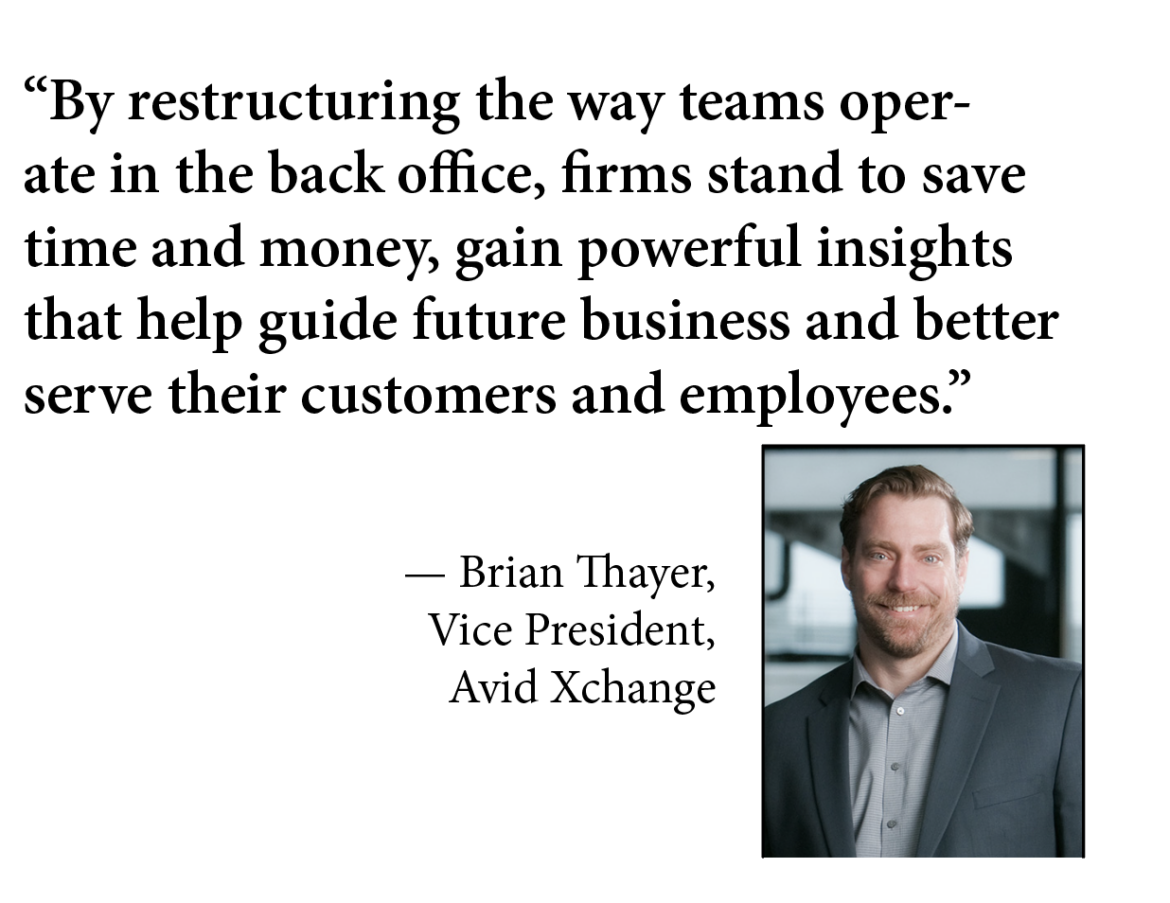By Brian Thayer of AvidXchange
Rising inflation is tough on business. But it’s pushing finance teams to evaluate the way they work while also providing these teams opportunities to make changes that will benefit them long after the economy stabilizes.
According to data from AvidXchange, 70 percent of finance professionals plan to adjust their budgets in response to inflation, with many looking for ways to reduce costs, work smarter and improve profit margins. Nearly half (48 percent) of those surveyed are prioritizing technology investments, and a third are looking to technology — including automation and artificial intelligence (AI) — to create efficiencies as they face a potential economic downturn.
Real estate, an industry notoriously slow for embracing technological innovation, is well poised to make these investments in modernization. By restructuring the way teams operate in the back office, firms stand to save time and money, gain powerful insights that help guide future business and better serve their customers and employees. Modernizing will also help strengthen retention efforts to secure talent and seize new opportunities for growth.

Brian Thayer, Avid Xchange
Here’s a closer look at how automation technology can help real estate firms future-proof their businesses amid rising inflation and a potentially looming recession.
Benefits of Automation
The real estate industry’s back office is highly complex, with people and paper scattered across properties. Bills for services and supplies are mailed or emailed to individual buildings where each form of communication must be deciphered and reconciled before those documents are sent to corporate offices for approvals and finally payment. This process is long and arduous and ties up cash.
When times are tight, there’s pressure on staff to take on more work and process documents as quickly as possible to ensure the firm maintains a steady cash flow and promptly pays suppliers. The workload and pressure can yield a staff that’s overworked and overstressed, making their work prone to costly errors and their job satisfaction low.
By removing paper and leveraging AI and automation to replace mundane, time-intensive tasks, firms can streamline and expedite work. Payment processes can shrink from three or four weeks to potentially three to seven days as invoices are digitally entered and matched with existing workflows, allowing them to be reviewed, coded and approved for payments with a few clicks. Once approved, these documents flow directly into an existing accounting system for payment processing. E-payment options can further accelerate payments for easier cash flow management and happier suppliers.
With automation tackling much of the work, staffers can put their time to better use, leveraging the visibility provided by automation to add greater value to the business. Workers can track financial activity and easily run reports to identify and address areas for improvement.
For instance, a notoriously late payer can be offered a more convenient payment method or an opportunity to capture an early payment discount. Workers can also use the newfound visibility and time to better manage cash flow, more accurately forecast and budget and help steer important decisions as their organizations navigate an evolving economic environment.
Invest in People
Inflation isn’t the only pressure on the real estate industry. According to the Commercial Real Estate Exchange, two-thirds of commercial real estate firms are grappling with a labor shortage that threatens their ability to grow.
Automation can help address this shortage by reducing the need for headcount. Just as important, it helps strengthen retention by giving people what they want — a more flexible routine and environment with more satisfying work.
Cloud-based solutions allow staff to handle tasks from anywhere, at any time, enabling the possibility of remote work and opening the talent pool to others. Work becomes less stressful and more rewarding, which in turn helps firms earn employees’ loyalty, despite a plethora of other opportunities available to them.
Firms that have invested in their employees by enhancing their jobs with technology are also more attractive to potential hires. Younger professionals — an increasingly important segment of the labor supply — aren’t generally willing to do the cumbersome work involved with manual processes and will often choose an employer that has modernized over one that fails to innovate.
The key for finance teams operating in an inflationary environment wrought with challenges is to focus on what they can control. Modernizing back offices by eliminating costly processes and empowering people is an effective and logical place to start.
— Brian Thayer serves as vice president and business line executive of real estate at Avid Xchange, a Charlotte-based automated software firm that serves the commercial real estate industry.


